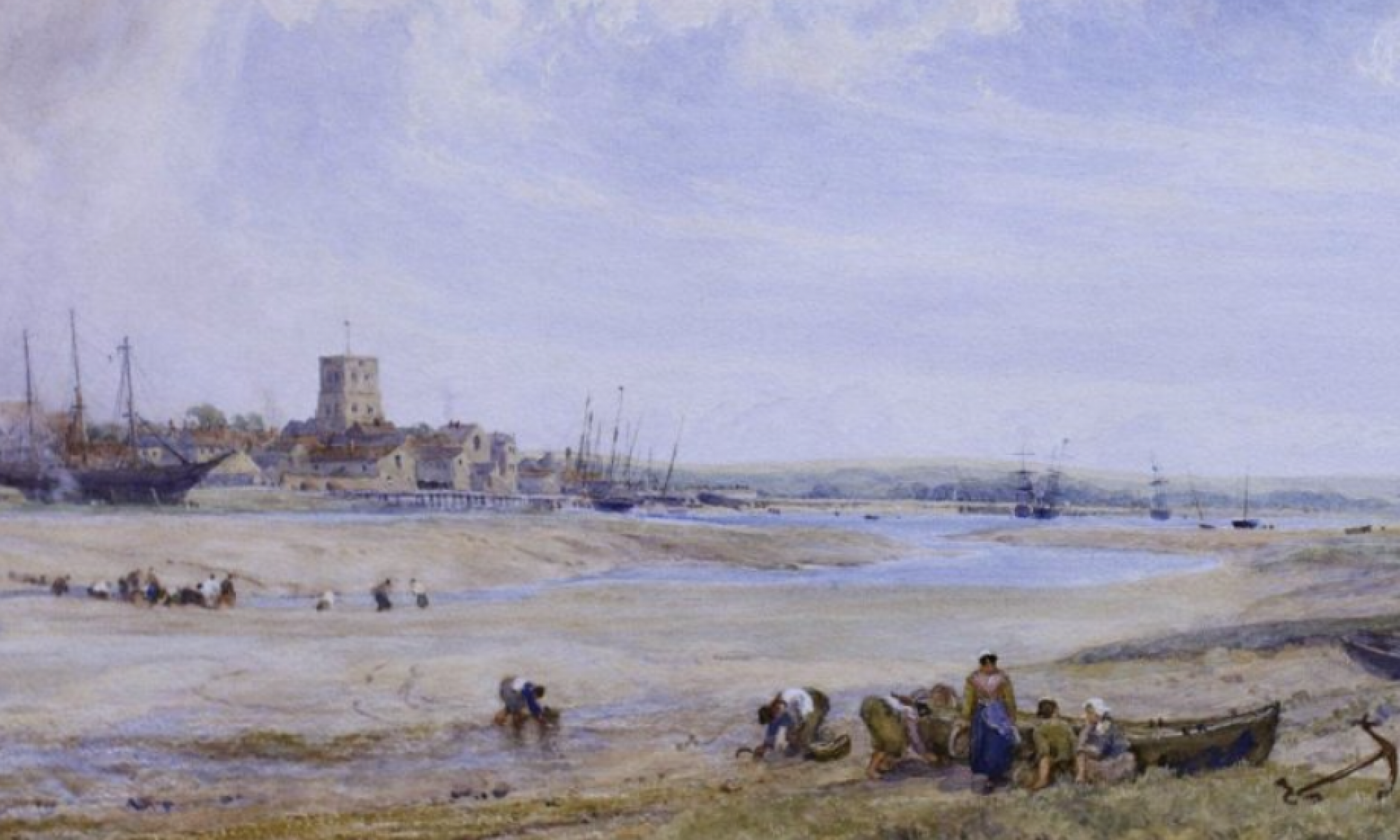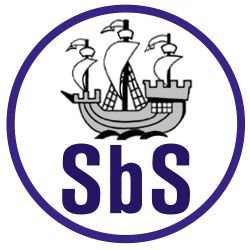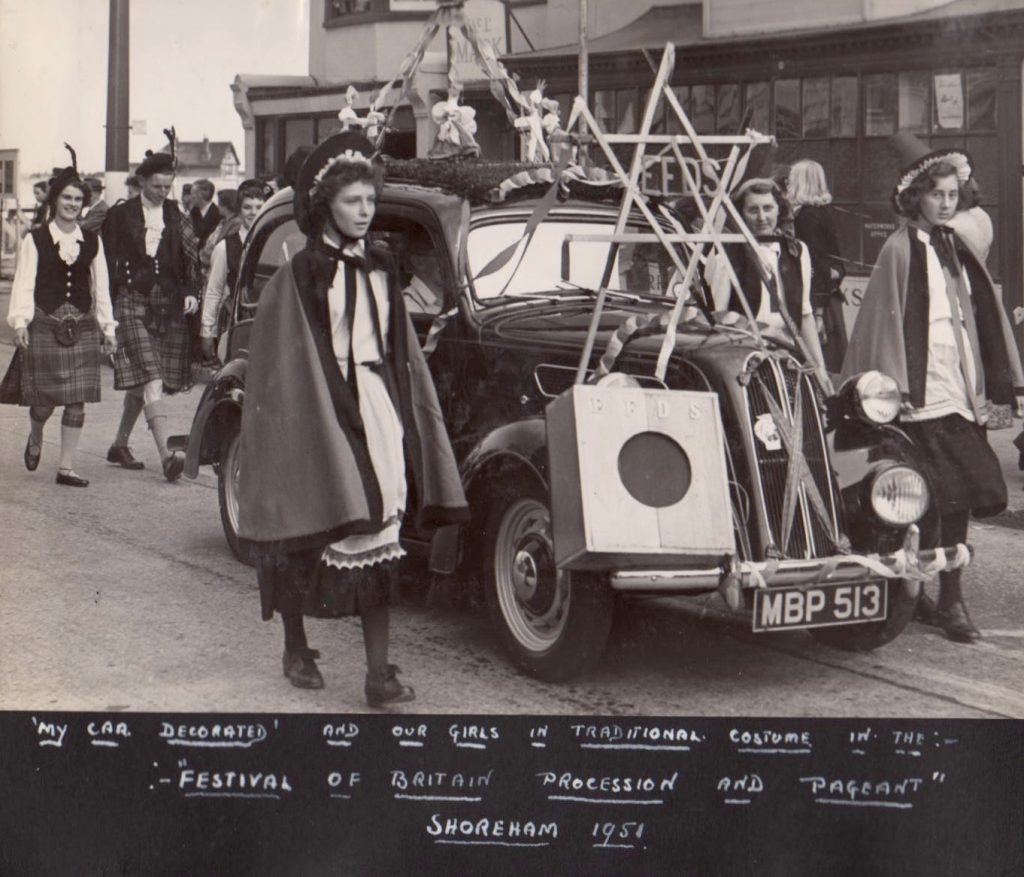The Life of Paul Redgrave Plumb 1924 – 2012
Written by Nick Redgrave Plumb for his father’s funeral ceremony in 2012
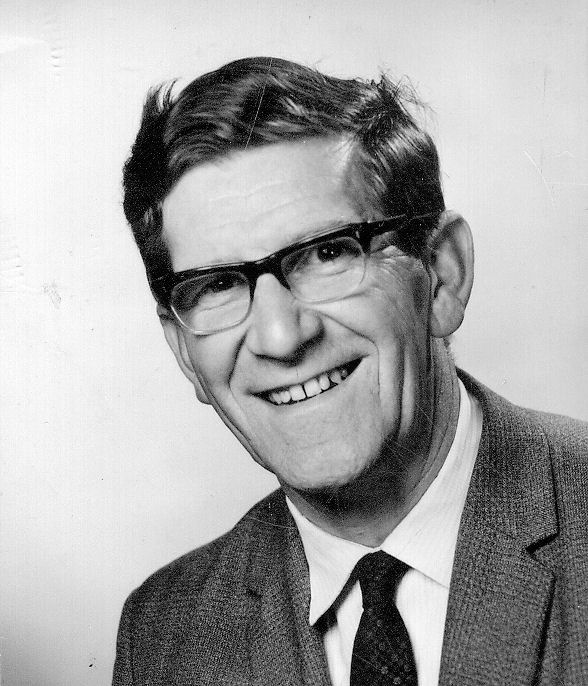
Paul was born on November 22nd 1924 to Daisy Ellen Plumb (formerly Barnes) and Ernest Redgrave Plumb at 27, Queens Place in Shoreham. He had an older brother Allen and sister Doris.
When he came into the world Doris immediately sent brother Allen to the Post Office (just over the road) where his Dad worked to tell him the good news. Allen ran all the way, so when he arrived he was completely out of puff and could hardly speak, but through the panting managed to say ….”It’s here!”. Paul had a thick mop of golden curls until the age of about 3. He remembered having a huge pram with big wheels & canopy and being pushed along by his sister Doris.
The Methodist Church was the place of worship for the family at the time Paul was born. He was christened there, went to Sunday School there and worshipped there all is life. His faith was strong and gave him great comfort for all his life and undoubtedly helped him to accept the inevitable prognosis of his brain tumour.
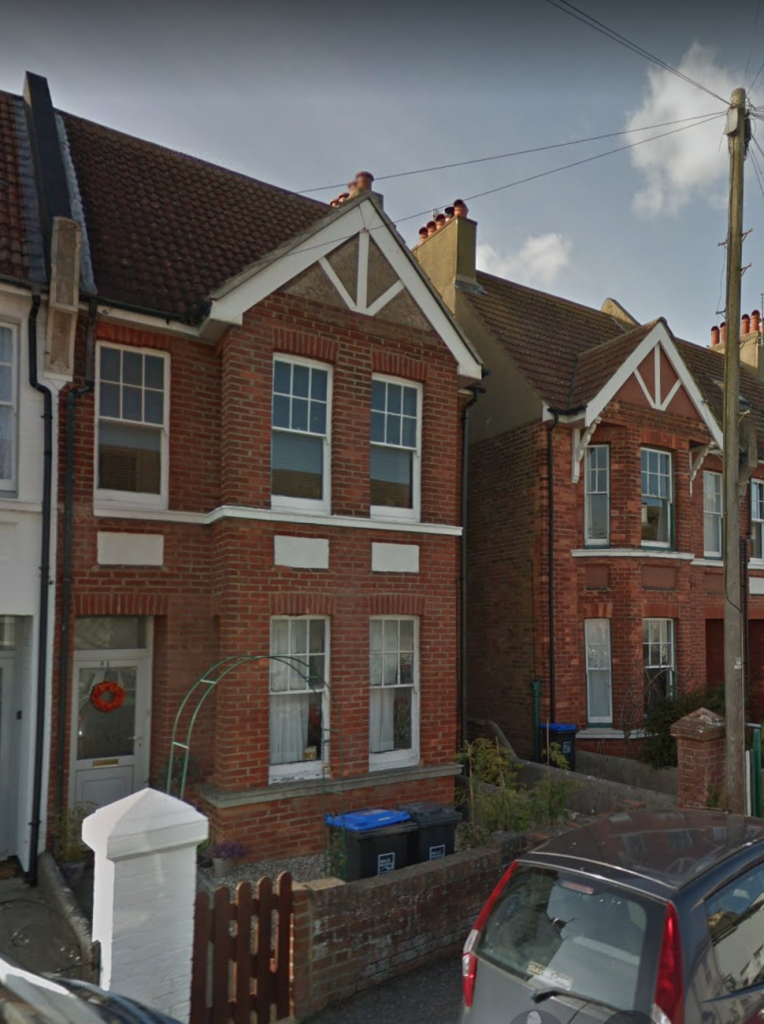
Paul attended Miss Glazebrook’s, a private elementary ‘Dame’ school, at 51 Victoria Road. Miss Glazebrook was the sister of the Landlord of the Bridge Hotel. She is reported to have ruled school with a rod of iron and specifically used 3 sturdy rulers to inflict her tyrannical regime of strict discipline.
He told us recently that “the round ebony one was lethal and boy did that hurt! The 2 other flat ones were for lesser offences”.
“When I was 5 and still attending her school my first real friend arrived, Jim Hoare, and after school I used to take great delight in going round to his house at number 3, Swiss Gardens because he had a scooter and a wheelbarrow. When I went home he would allow me to either push the wheelbarrow or scoot on the scooter”.
In those days the children didn’t have books instead, they had a slate with wooden surround and slate pencils. All writing was done on the slate and at the end of the day they used a galvanised bath, half filled with water and rags to wash the slates clean.
“When we arrived at the school we had to stand down the alleyway beside the house on a shingle path and wait until Miss Glazebrook came to open the gate to let us into the kitchen. We had to walk through because she insisted on us washing our hands in a stone sink and pumice stone and primrose soap and dry them with rags. Then we traipsed up to the schoolroom. On one occasion I arrived for the afternoon session rather early. I was the first one through the gate and it started to rain so I wanted to go in and get out of the rain and I didn’t know how to attract her attention. She never did come until the usual time and we all traipsed in. Indeed I got the ruler for being too early. We used to go round to the Bridge Hotel and go upstairs into the Billiard room and the whole place smelt of stale beer. My parents being strict Methodists didn’t want me to have anything to do with beer as it was totally heathen, so when I came out to go home I used to go the longest way round as fast as I could to get the wind through my clothes to get rid of the smell of stale beer.”
But apparently, she was a very good teacher and pupils left there being able to do joined up writing, which they often had to unlearn again when moving on to their next school as they were too far advanced.
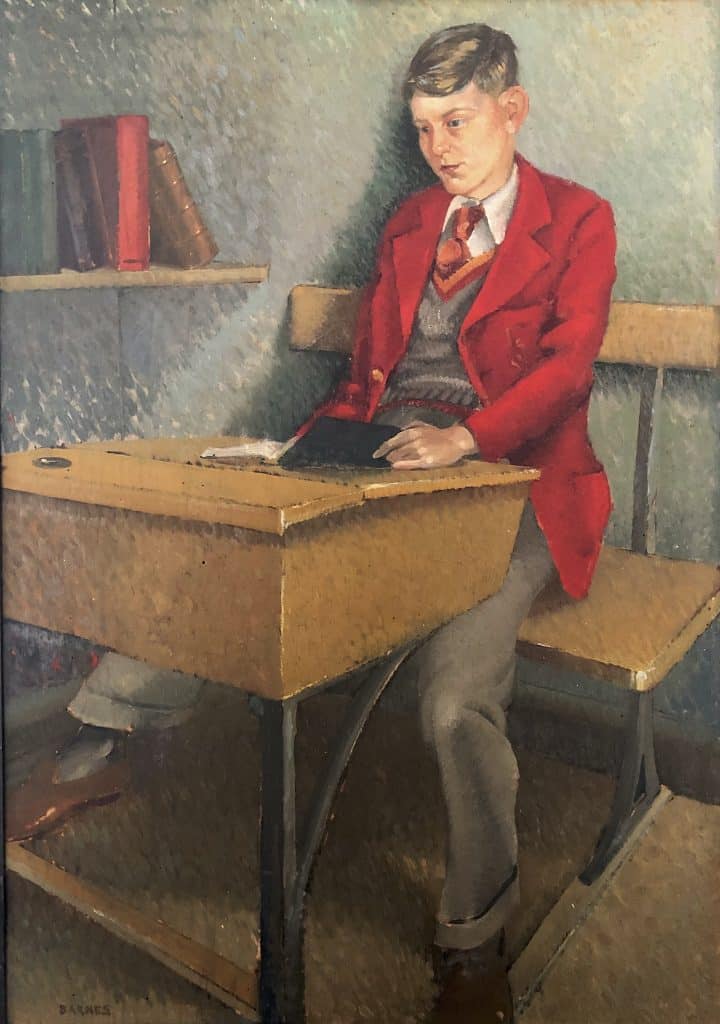
Paul went on to attend Sussex High School for boys in Shoreham. It was at this school where he met his good friend John Hobbs and they have had common interests ever since. John often helped Paul out with hay cutting and other such tasks, as did his other local farming friends including the Passmores. The school was run by a headmaster called Mr R. B. Warren and 2 staff. The pupils had a uniform consisting of a maroon blazer with red piping round the edges and SHS embroidered on the pocket. The school was situated on the corner of Rosslyn Road and Buckingham Road where Normanhurst is today. Doris and her Parents wanted Paul to have the best education available so Paul’s schooling was partly paid for by sister, Doris who being older was working as head clerk at a local jam and chutney factory in Dolphin Road called L. Cook and Company. Doris was only earning 10/- a week and she contributed 2/6 a week from her wages to pay for his schooling.
Paul said “So one day I was taken by my Dad to H. C. Lucking and Sons in East Street and kitted out with long grey socks, short grey trousers with a neat crease down the front, grey pullover with red and gold stripe round the neck and cuff bands, a maroon jacket with red piping round the edges, a badge on the pocket SHS for Sussex High School and a maroon cap.”
Sussex High School was only just round the corner from where he lived in Queens Place and he was very pleased he only had a short way to go to school.
Paul’s life-long friend Jim, lived in Swiss Gardens and as a small boy, Jim recalls that Paul came round to his house one day and together they painted the front fence, apparently Paul got more paint on him than on the fence and that got into BIG trouble when he got home!
As a young boy, Paul was always interested in farming and horticulture and growing all manner of things. He had his first attempt at keeping chickens at a place called cocker-roost barn. This was situated somewhere near the bottom of Mill Hill and co-incidentally very close to the property he would eventually buy to raise his family. Paul was a little concerned that there was tree-hollow nearby where a fox lived, not ideal as he was keeping chicken close-by. We are sure this was the start of the loathing he had for foxes, because they frequently raided his fortifications and dined on his feathered friends. Paul was always coming home with new animal recruits to his menagerie. On one occasion, he is reported to have acquired some young goats. His Mother was far from pleased about this so instructed his Father to read him the riot act. On his return from work the Post Office, Paul’s Dad duly told him off but at the end of the dressing-down said “but they really are rather nice aren’t they? This illustrates the very kind nature of his father.
Paul’s first job was what he called a “stamp licker” which was another term for an office boy, working at Shoreham Town Hall for just 7 shillings a week.
When he finally left his job at the Town Hall he went on to develop the smallholding interest into a career. He knew a gentleman who encouraged him to take on a small piece of land at Small Dole that was rented for the princely sum of £100 per year. It was here he first started his interest with horses and ponies. At that time he kept all manner of creatures including turkeys, geese, chickens, ducks and he also had a small glasshouse where he grew saleable, edible goods such as tomatoes and lettuce. Paul mentioned that he kept the animal feed in a disused railway carriage.
“I was in Steyning Market when war broke. I used to buy – white leghorn cockerels’ 1/6 each, buy them on a Weds, kill, pluck and dress them properly and sell them the following Wednesday @4/-. I’d sometimes set rabbit wires on the farm next door – owned by Mr Cross. I had an Exmoor pony called Peggy who pulled a Governess Cart and a dog called Panda. We’d regularly go from Small Dole to Brighton as I supplied the Officers Mess at the Hotel Metropole. Peggy would be tied to a lamppost and I’d have to walk through the Airman’s mess where I often got ribbed about joining up. So eventually I did sign-up. I told them I was 18 but actually I was only 17 ½”
In 1942, Paul bravely joined the RAF at the age of 17 ½, (he needed to be 18 of course) and was sent north to Padgate in Cheshire for basic training two weeks after his 18th Birthday. He trained as a wireless operator in Wellington and later, we think, Lancaster bombers. We know that he was involved in a number of bombing sorties over Europe before being posted to Egypt. We understand that his plane came down in the desert; he was the sole survivor and was missing for several days before being rescued from the wreckage. A result of this was undoubtedly his lifelong hatred of being alone and he returned from the middle east damaged.
When he was de-mobbed from RAF, he went to work for Farmers and Growers, which was later to become Fargro as a travelling salesman. He had always had a keen interest in farming, horticulture and in particular keeping small farm animals of course. This manifested further when he made a decision to go away to study at the Horticultural College in Swanley in Kent. It was from here that he told us the story of how one of his colleagues had a motorbike that was his pride and joy.
“One day when this poor chap had gone out, several of us took the bike apart, carried it upstairs and reassembled it inside the building” no doubt much to the annoyance of the owner and great amusement of everybody else”.
In 1947 Paul went to his first 1st square dance in Storrington. Paul had tried his hand at Ballroom dancing (we know this because we found a Bronze award certificate dated 1946), but suspect he found the style too formal. His ballroom dancing teacher had taken him to a square dance taken by Mary Gadd, the Director of the American Country Dance Society. She had come over to England to introduce American square dancing to the heathens of England and to ‘liven-up” the Brits after the war days.
He clearly took to this style of dancing, as Paul and Jim were instrumental in starting the Shoreham Country Dance Club together. Paul was the first chairman of the club. During those first years the Morris Dancing group was created within the club itself before branching out as a separate group on their own. Geoff and Ann Mansbridge were also club members then and remained close friends. The Mansbridge and Plumb family were became more connected when Paul’s Son Chris married Geoff and Ann’s daughter Nicola in 1996.
In Early 1950’s Paul started taking public country dances, at Fetes, School, Young Farmers Clubs and such like, which he did for very many years. He became popular indeed, in great demand and in later years earned the title of ‘Ol ‘ Mr. Square Dance’.
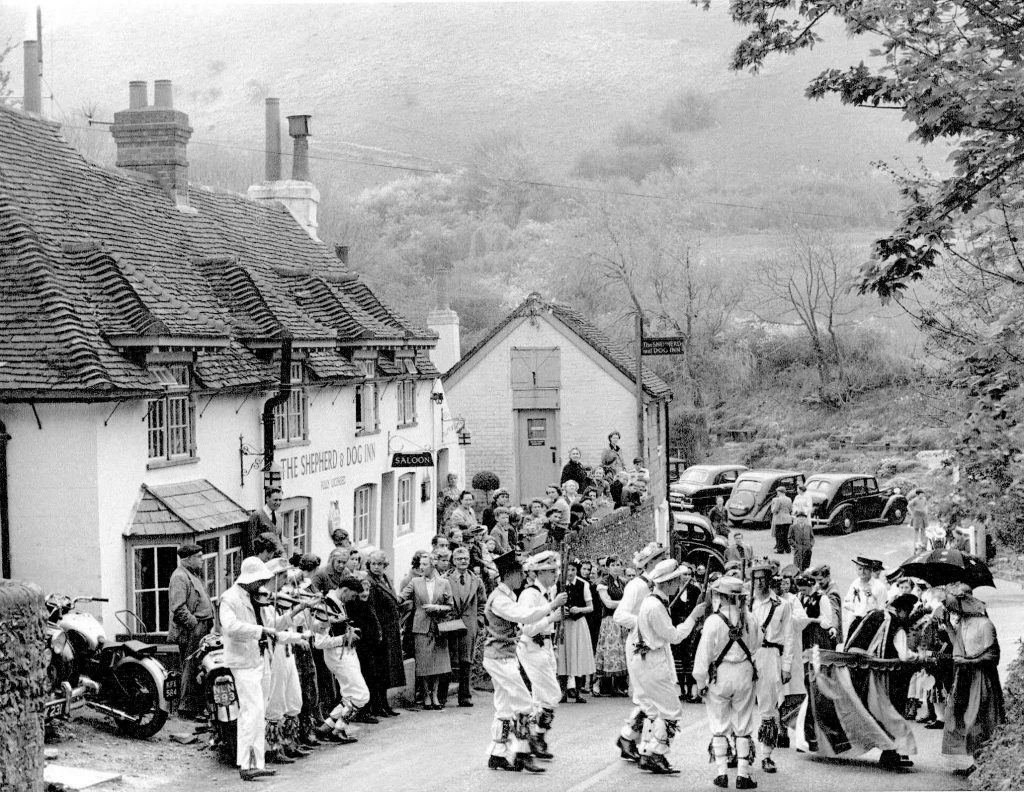
In 1951 –There was a carnival parade through Shoreham for The Festival of Britain. Paul’s Ford A4 car was decorated with a maypole and music played from a machine on the back seat to a speaker on the top of the roof. There were 4 people dressed up as the Morris and another 4 people in English, Scottish, Irish and Welsh costume.
Paul was also responsible for starting up the Shoreham’s May Day festivities the first one being in 1952. This brought together many old traditions and comprised folk dancing through the streets and the calling at the homes of local Shoreham dignitaries for an early morning wake-up call and with the spectacle of many people descending on their driveways dancing and generally having fun.
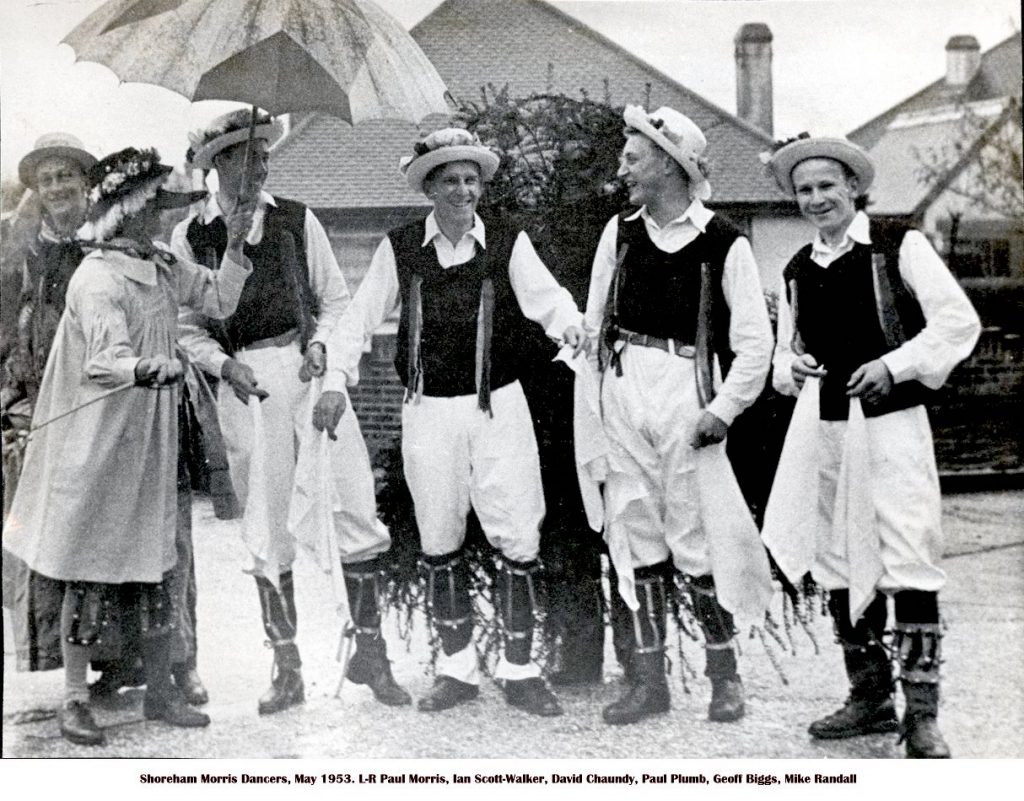
In 1954 Paul was asked by West Sussex County Council’s Youth Department, where his Brother Allen worked, to take a group of dancers all the way to Neustadt, in Northern Germany for the European Folk week. Allan made a traditional hobbyhorse to take with them, which was affectionately named Willy. We are told that Customs Officers on both side of the channel were quite interested in the Hobby Horse and examined him “very carefully” Willie now belongs to the Marlipins Museum. Whilst there one evening, he heard some beautiful choral music coming from somewhere, so went to find out where it was coming from. There was a group of singers called the Landsberger Jugendchor – from Landsberg Bavaria. There he met a talented group of musicians and singers. This was the beginning of some very strong friendships within this group, several of which still continue to this very day.
After a short courtship, at the age of 29 in 1954, Paul met, fell in love with and married Evelyn Alder daughter of Mr. Charles and Mrs. Christiana Alder of Petworth. In 1957, Nicholas arrived, followed by daughter Caroline in 1960 and finally son Christopher in 1963. Paul adored his Wife and Children and doted on them. He loved the garden too, especially growing fruit and vegetables. There are many stories to be told from life at the Plumb bungalow, 9 Mill Hill Gardens. There was rarely a dull moment. Paul worked 6 days a week and often did 2 or 3 three Barn Dances on a Friday and Saturday evening. Daughter Caroline and son Chris remember very well though what happened on Sunday mornings. Before Church, he would go down to the end of the garden, choose a nice fat chicken, kill it, pluck it and prepare it for dinner. This is not of the feint-hearted of course, but they just grew up thinking it was the norm. Normally in June, he’d get hold of two or three turkey chicks, sometimes a few more. He’d rear them for 6 months and just before Christmas they’d be prepared for Christmas dinner. The Plumbs always had a huge Turkey for Christmas and the others would be sold to order in the shop. Holidays were always fun for the children. This normally involved a caravan, which was dragged all over the place. Scotland, Wales and in the early years the car dragged the caravan, wife and kids through many European countries especially Germany where he has so many good friends.
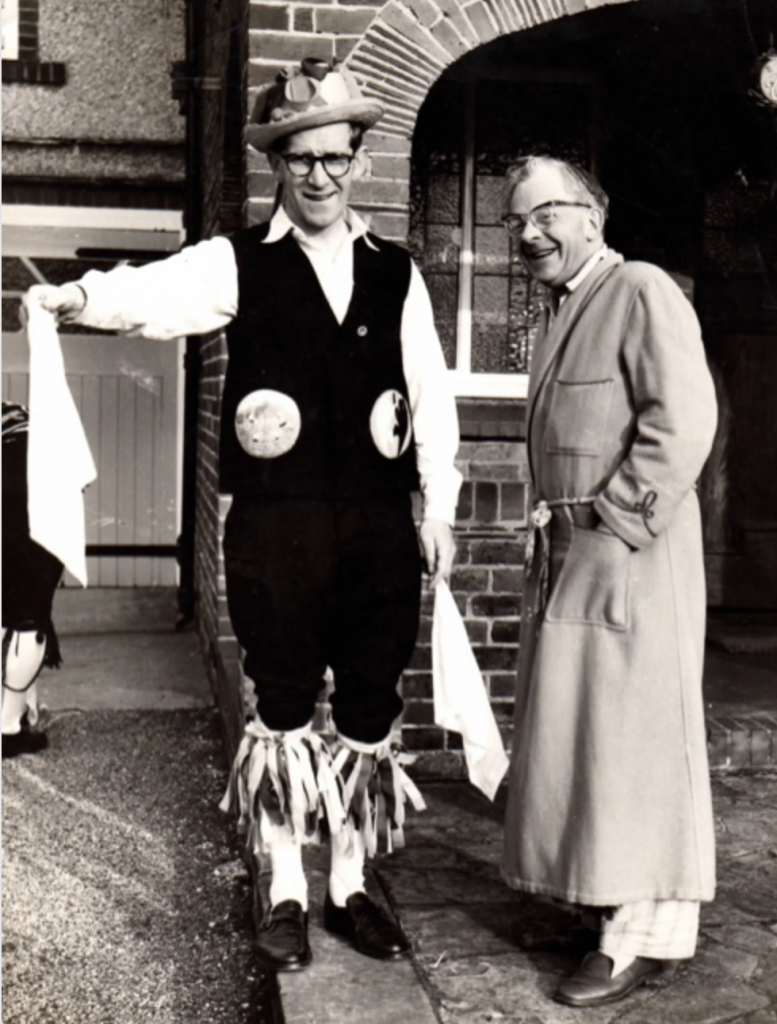
Having been employed for a few years his entrepreneurial spirit directed him to his first shop at 94 High Street, a small lock-up unit rented from Mr. Jack Harker. In the early years he was a purveyor mainly of things he had previously been selling to Nurseries and farms in Sussex as a travelling salesman, but eventually that led him on to other things. His aspiration was to definitely to be a “gentleman’s outfitter” but he would turn a shilling wherever he could. He would grow quite large quantities of tomatoes, cucumber and lettuces in his big greenhouse at home and sell them from the front of the shop, eggs too from the chickens that lived at the bottom of the garden. The greenhouse was also the source of a plentiful supply of the best peaches you had ever tasted. Grapes as well, but most of these went into his homemade wine.
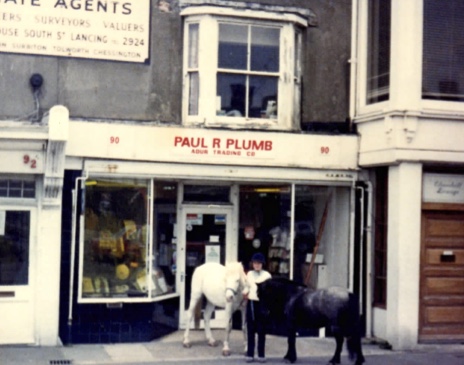
Paul traded under the name of Adur Trading Company and after a few years he moved to much larger premises only two doors up to 90 High Street and he a had a shop in East Street Shoreham for a while too. Sister Doris was still there looking out for him and the valuable experience she had with bookkeeping was put to good use with Adur Trading Company. Doris was there from the early days of the business right up to when she died in June 1985; way after she should have retired –that was the devotion she had for her brother.
Business was booming and eventually 90 High Street was bought and paid for through hard work and effort. But good luck didn’t follow him everywhere because Paul’s Mother Daisy was diagnosed as being terminally ill in 1964 and died which affected him greatly as he dearly loved his Mum.
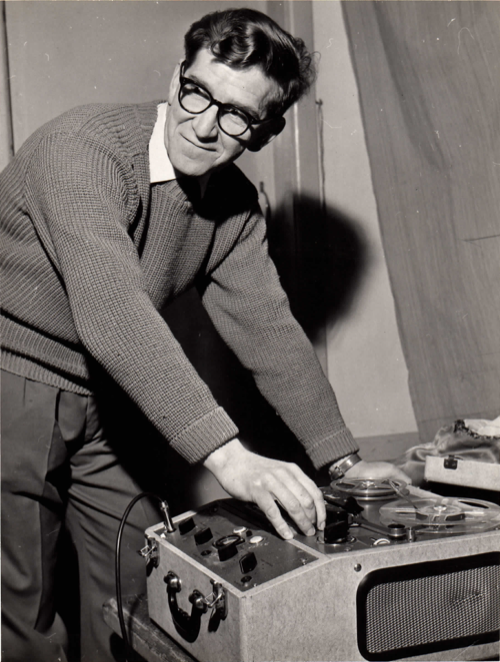
Another of Paul’s interests was amateur film-making. Having bought his first state of the art 8mm cine camera in the early 1960s he got together with a group of like-minded individuals to start Shoreham Cine Club. This group had a wooden clubhouse purchased from one of Paul’s contacts in farming and the members of the club moved it from Littlehampton and re-erected it in Ropetackle, Shoreham. They were responsible for making a number of films including “A river runs through our town” which is a video diary of Shoreham and the people who live there and also “Shoreham Peeps”. Today this is valuable archive material. Also, for several years during the 1960s Paul wrote, presented and even recorded himself, a folk music program on BBC Radio called “Make Mine Country-Style”. This was broadcast on the BBC Light Programme and produced by his good friend David Allan. Paul would also go on to create programmes of a similar nature for BBC Radio Brighton and BBC Radio Medway too.
Probably one of the things Paul is best known for is his battle against the introduction of decimalisation in the early 1970s. He felt in his heart that to change the British currency was totally wrong and would cause unnecessary confusion for many people, especially the elderly and would fuel inflation and he was probably quite right. He always fought against petty bureaucracy and stupidity wherever he found it and developed a real talent for complaining about all kinds of things he disagreed with. The press got hold of the fact that he refused point blank to sell his goods in the new decimalised currency and he was called in for interview and comments to national radio and TV programmes and the newspapers loved it too. At the time he ran his shop Paul was frequently in the both the local and national paper, radio and news reports for one thing or another. Only recently, he was taking Sky to task for the lack of local Sussex news in their broadcasts!
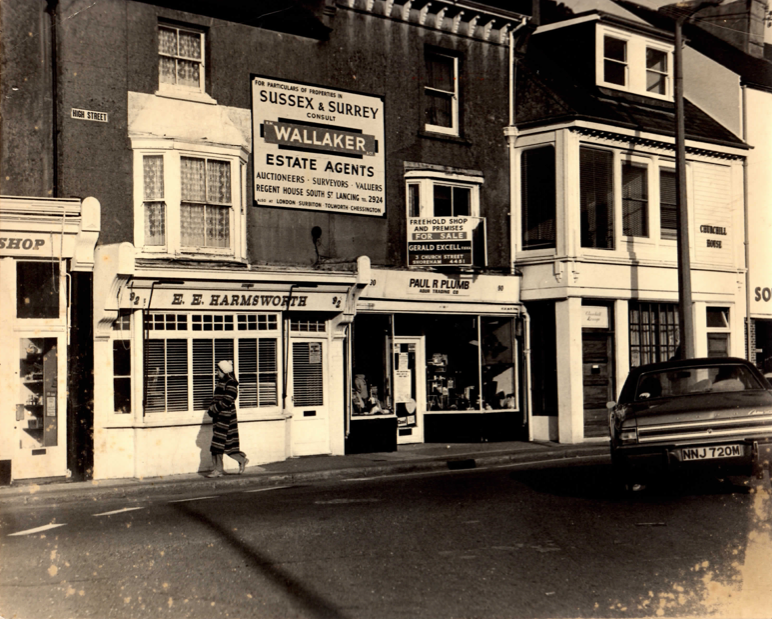
Around the time that BBC Radio Brighton was launched in 1969 Paul called the biggest public dance of his career at the Corn Exchange in Brighton along with The Blue Mountain Band. It is reported that there were some 2,000 people having fun at that event. On another occasion he took a dance at the Royal Albert Hall and had to spend the entire evening standing sideways because his zip fly had broken.
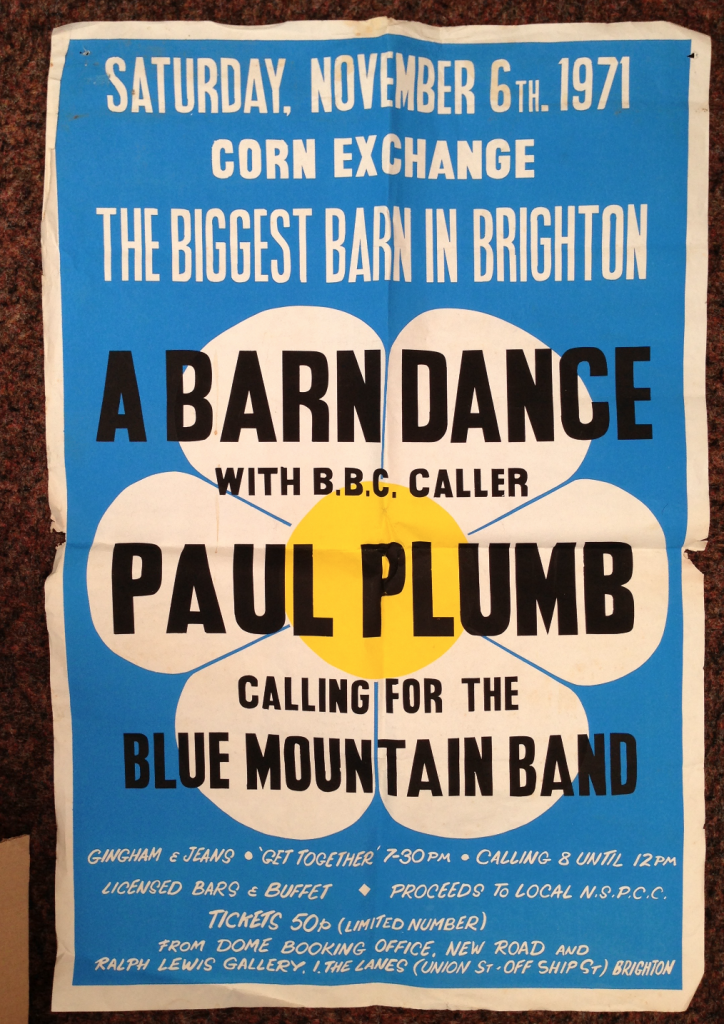
During the war years he’d started smoking like a great many other people and kept it up, mainly cigarettes and even a pipe for a while, but he managed to give it up towards the end of 1960s and from then on hated it with a vengeance. So he decided to share the secret of his success with others and started an anti-smoking campaign.
Around summer 1974, Paul had been at Folkestone Festival on BBC business and had taken his caravan to sleep in. In the field next door were two Shetland ponies. Not long after the trip these ponies called Bonnie and Bess were delivered to the bungalow in Mill Hill Gardens. He rented a small corner of the field behind the property and that’s where they were to live. The children and their friends were out riding all the time. This was the start of a string of a collection of ponies and horses that weren’t really for the children at all – they were for him of course. Mally a Welsh Cob, of some 16 hands was his particular favourite. Paul trained Mally for driving and later Paul, Mally and several willing helpers were often out on events such as weddings, carnivals and fun days.
In 1967, Paul retired from calling regular club night dances at Shoreham Country Dance club, but continued to attend periodically as guest caller for a number of years afterwards.
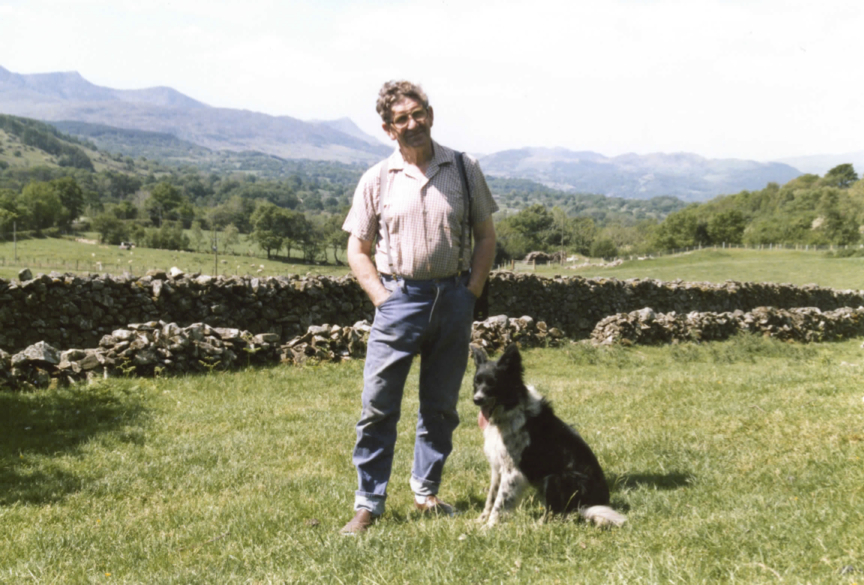
Paul eventually closed-down Adur Trading Company, retired in 1986 and bought a small farm comprising 22 acres in Brithdir, North Wales where he made many friends. Ann Leaney, his long-term girlfriend was there too along with her Bearded Collie Megan. His interest in “out of town” never abated and in Wales he kept sheep, a few cows, horses (including Mally) and menagerie of ducks, geese, chickens, cats. Also, his faithful dog Yogi who went everywhere with him and a sheepdog called Jessie. Whilst in Wales he even started up an enthusiastic new country-dance group at Blaenau Festiniog.
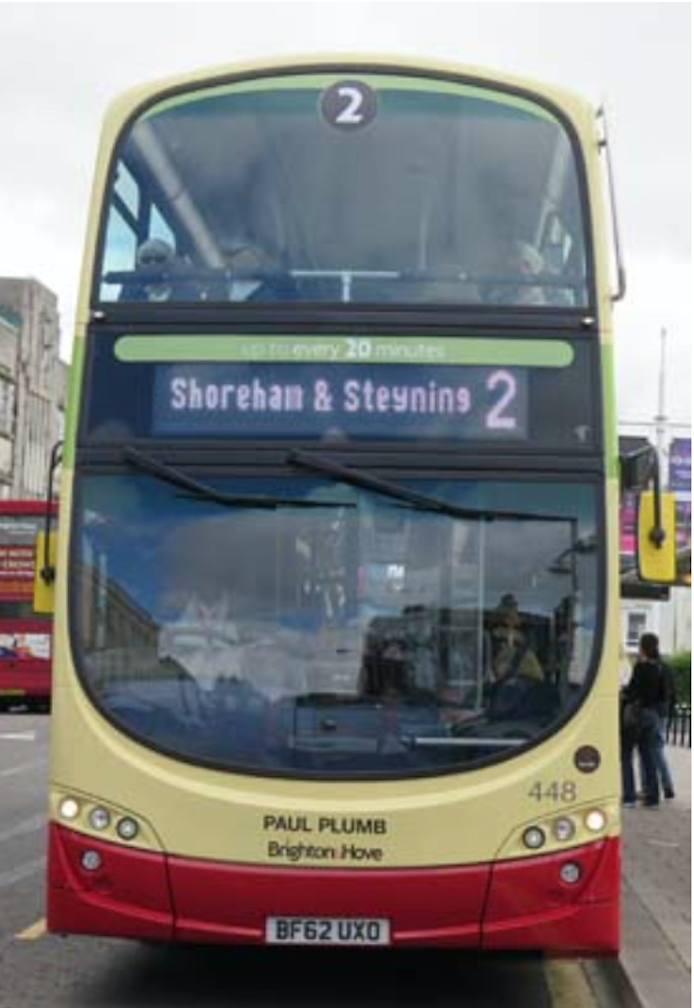
Paul’s Dad Ernest, affectionately known within the family as Mumpsie, went to Wales too, right up until when he died in February 1989. Paul and Mumpsie were always especially close and thought the world of each other. Paul was devastated when Mumpsie passed away at the ripe old age of 94.
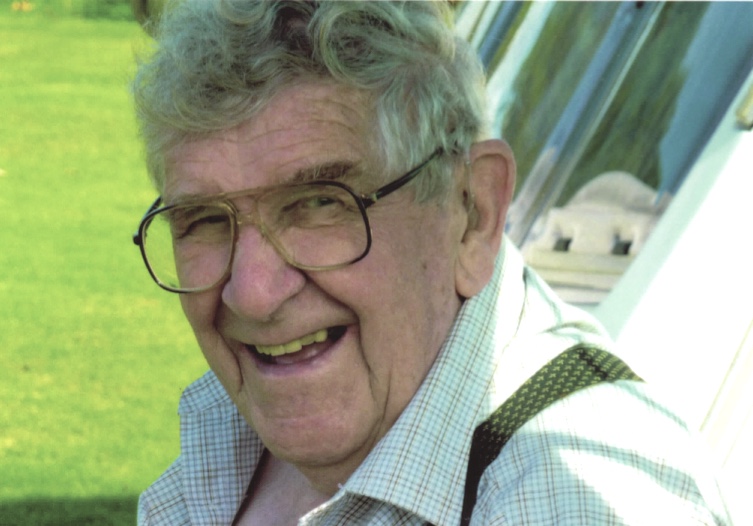
Eventually in about 1996, Sussex called home her son Paul Plumb and he moved back to 9, Mill Hill Gardens. In 2003 at the age of 76, he married Margaret. Margaret was not a well person and she passed away in 2008.
Paul leaves a total of 5 grandchildren, Charlie, Eleanor, Joanna, Edward and Stephanie, all will miss him greatly.
Paul led a full and active life right up to the beginning of this year 2012. He lived life and lived it to the full. He was one of a kind, a gentleman of integrity, a person who made things happen, a Father, Grandfather, Husband, Uncle, Partner and friend to an incredible amount of people. He loved his friends and family and he always encouraged, supported and advised them in any way he could.
Nick Plumb 2012
all photographs copyright Nick Plumb
You can see some of Paul Plumb’s films here.
